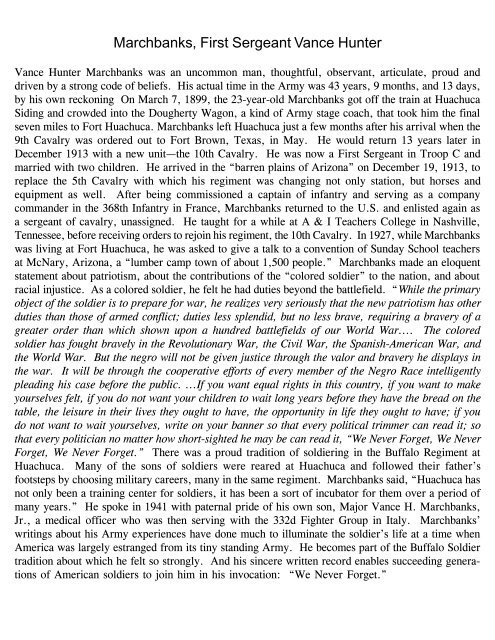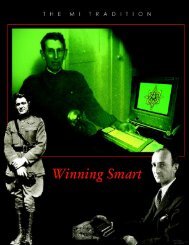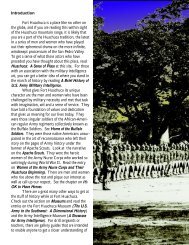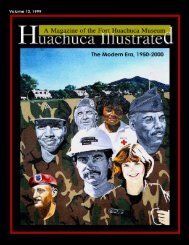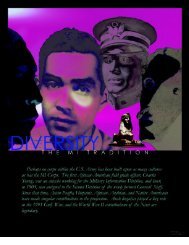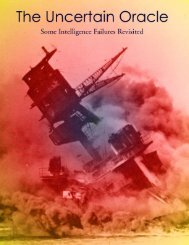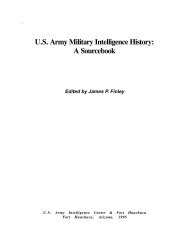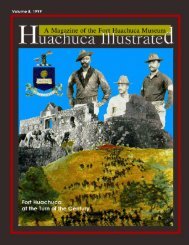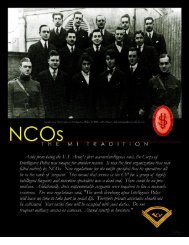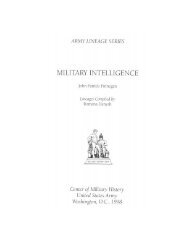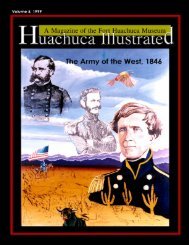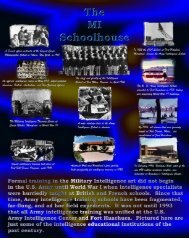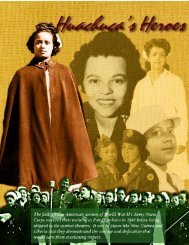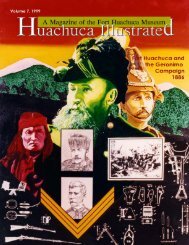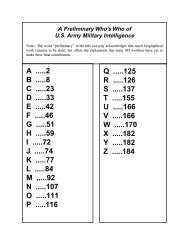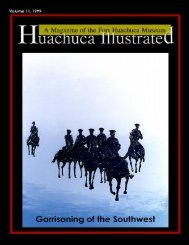You also want an ePaper? Increase the reach of your titles
YUMPU automatically turns print PDFs into web optimized ePapers that Google loves.
Marchbanks, First Sergeant Vance Hunter<br />
Vance Hunter Marchbanks was an uncommon man, thoughtful, observant, articulate, proud and<br />
driven by a strong code of beliefs. His actual time in the <strong>Army</strong> was 43 years, 9 months, and 13 days,<br />
by his own reckoning On March 7, 1899, the 23-year-old Marchbanks got off the train at <strong>Huachuca</strong><br />
Siding and crowded into the Dougherty Wagon, a kind of <strong>Army</strong> stage coach, that took him the final<br />
seven miles to <strong>Fort</strong> <strong>Huachuca</strong>. Marchbanks left <strong>Huachuca</strong> just a few months after his arrival when the<br />
9th Cavalry was ordered out to <strong>Fort</strong> Brown, Texas, in May. He would return 13 years later in<br />
December 1913 with a new unit—the 10th Cavalry. He was now a First Sergeant in Troop C and<br />
married with two children. He arrived in the “barren plains of Arizona” on December 19, 1913, to<br />
replace the 5th Cavalry with which his regiment was changing not only station, but horses and<br />
equipment as well. After being commissioned a captain of infantry and serving as a company<br />
commander in the 368th Infantry in France, Marchbanks returned to the U.S. and enlisted again as<br />
a sergeant of cavalry, unassigned. He taught for a while at A & I Teachers College in Nashville,<br />
Tennessee, before receiving orders to rejoin his regiment, the 10th Cavalry. In 1927, while Marchbanks<br />
was living at <strong>Fort</strong> <strong>Huachuca</strong>, he was asked to give a talk to a convention of Sunday School teachers<br />
at McNary, Arizona, a “lumber camp town of about 1,500 people.” Marchbanks made an eloquent<br />
statement about patriotism, about the contributions of the “colored soldier” to the nation, and about<br />
racial injustice. As a colored soldier, he felt he had duties beyond the battlefield. “While the primary<br />
object of the soldier is to prepare for war, he realizes very seriously that the new patriotism has other<br />
duties than those of armed conflict; duties less splendid, but no less brave, requiring a bravery of a<br />
greater order than which shown upon a hundred battlefields of our World War.... The colored<br />
soldier has fought bravely in the Revolutionary War, the Civil War, the Spanish-American War, and<br />
the World War. But the negro will not be given justice through the valor and bravery he displays in<br />
the war. It will be through the cooperative efforts of every member of the Negro Race intelligently<br />
pleading his case before the public. ...If you want equal rights in this country, if you want to make<br />
yourselves felt, if you do not want your children to wait long years before they have the bread on the<br />
table, the leisure in their lives they ought to have, the opportunity in life they ought to have; if you<br />
do not want to wait yourselves, write on your banner so that every political trimmer can read it; so<br />
that every politician no matter how short-sighted he may be can read it, “We Never Forget, We Never<br />
Forget, We Never Forget.” There was a proud tradition of soldiering in the Buffalo Regiment at<br />
<strong>Huachuca</strong>. Many of the sons of soldiers were reared at <strong>Huachuca</strong> and followed their father’s<br />
footsteps by choosing military careers, many in the same regiment. Marchbanks said, “<strong>Huachuca</strong> has<br />
not only been a training center for soldiers, it has been a sort of incubator for them over a period of<br />
many years.” He spoke in 1941 with paternal pride of his own son, Major Vance H. Marchbanks,<br />
Jr., a medical officer who was then serving with the 332d Fighter Group in Italy. Marchbanks’<br />
writings about his <strong>Army</strong> experiences have done much to illuminate the soldier’s life at a time when<br />
America was largely estranged from its tiny standing <strong>Army</strong>. He becomes part of the Buffalo Soldier<br />
tradition about which he felt so strongly. And his sincere written record enables succeeding generations<br />
of American soldiers to join him in his invocation: “We Never Forget.”


